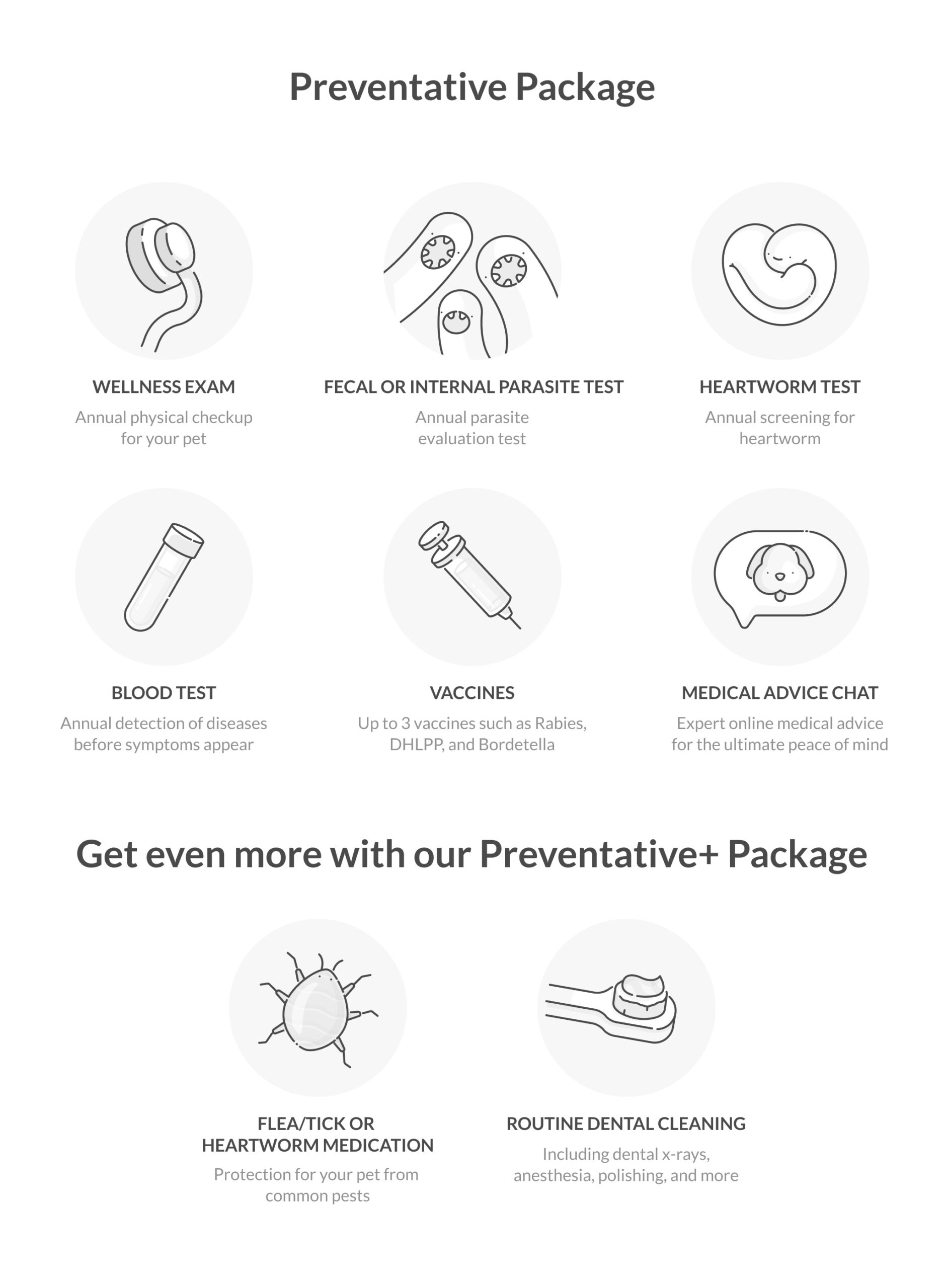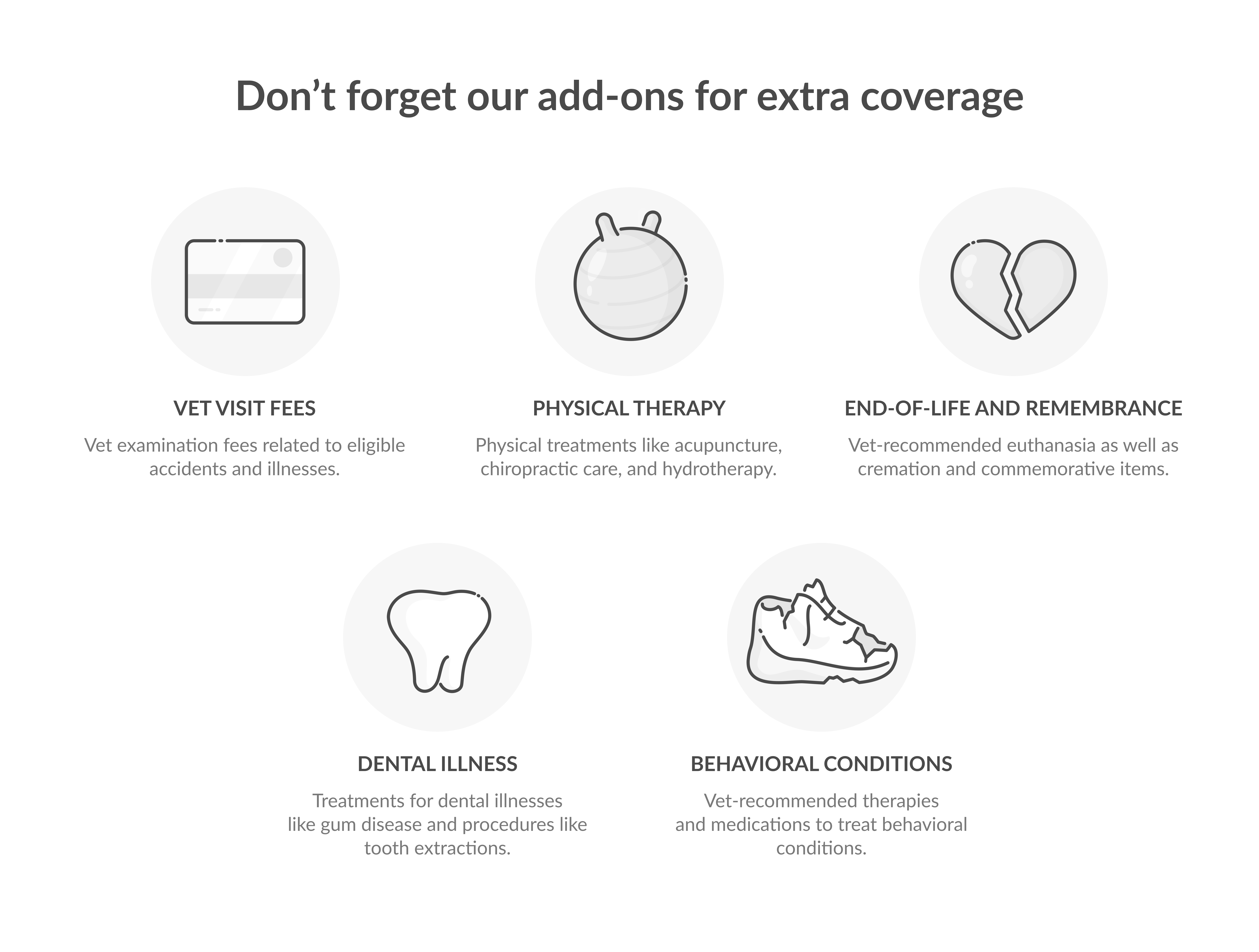We get it: You probably take better care of your pet’s health than your own.
You’ve been muscling through that back pain or that throbbing wisdom tooth of yours for months now, but the second your dog or cat starts making a sound you’ve never heard before, panic ensues. That’s what pet health insurance is for– while you’re worrying about what was probably just a hairball, you can rest easy knowing that your next anxious emergency vet visit isn’t gonna cost you an arm and a paw.
A basic Lemonade pet health insurance policy provides coverage for treatments or medical care for surprise illnesses, or mishaps that have injured your furry friend. Even though you’re taking excellent care of your pet, you can’t anticipate what might happen as they grow older–certain conditions can develop and worsen super quickly, and accidents can happen at any moment, no matter how old your pet is.
But we’re not here to bum you out, and we definitely don’t want to make you feel stressed out about your pet’s health… just informed.
We’ve got the ins and outs of what would be covered–and in this case, not covered–under your pet health insurance policy. That way, there won’t be any surprises when it comes time to pay your next vet bill or file your next pet insurance claim.
Here are some things that are probably not covered by your pet health insurance:
- Something that occurs before your waiting period is up
- Pre-existing conditions
- Bilateral conditions
- Things that aren’t an accident or illness
- Something you could have prevented
- Treatments from more than 180 days ago
- Treatments that are experimental
- Your pet’s friends
Something that happens before a waiting period is up
A waiting period is the amount of time your pet insurance company requires you to wait until your pet is eligible for reimbursement regarding specific conditions. Once you activate a Lemonade dog insurance policy, there are three different waiting periods to keep in mind before you can file a claim:
- Two days for accidents
- Fourteen days for illnesses
- Six months for cruciate ligament events
These waiting periods begin on your policy’s start date, and your insurance company can only offer reimbursement for your claim after the waiting period ends.
Pre-existing conditions
A pre-existing condition refers to any kind of illness or health issue your pet developed before your waiting period was up on your pet insurance. It doesn’t mean pet insurance companies won’t insure your pet, it just means your plan won’t cover costs that directly relate to any ailment they were diagnosed with, or showed signs of, before they had a pet insurance policy.
For example, if your cat Anastasia develops allergies, you’ll want to fill her prescription quickly to get her the relief she needs. Those sneezes may be cute, but the cost of her prescription every month is less adorable. If you got cat insurance for Anastasia before she became allergic, your pet insurance company will be sending payouts your way… but if you wait until the allergies show up to get insured, you’ll be out of luck.
That’s why it’s so important to get insurance before you actually need it, especially when it comes to your pet insurance plan.
Bilateral conditions
You won’t hear about a lot of pet health conditions before they’re suddenly a part of your pet’s life, and a bilateral condition is one of the more confusing ones. These conditions are covered as part of your pet health insurance, but only if there’s no mention or indication of this on either side of your pet’s body (especially as noted in your pet’s medical records). How is that different from any kind of pre-existing condition?
Bilateral conditions are anything that can affect both sides of your pet’s body. Things like cherry eye, cataracts, hip dysplasia, or a luxating patella all count, and if one side of the body shows signs of a bilateral condition before your policy starts, your pet won’t be covered if the condition later affects their other side.
So if your Havanese, Casper, developed glaucoma in his right eye before he got dog insurance, it wouldn’t be covered since it would be considered a pre-existing condition. If you get him pet insurance and two years later he develops glaucoma in his left eye—that wouldn’t be covered, either.
Things that aren’t an accident or illness
A basic Lemonade pet health insurance policy will cover your dog or cat for the following, in the event that they experience an unexpected accident or illness.
- Diagnostics: Blood tests, x-rays, MRI’s, CT scans and lab work
- Procedures: Outpatient, specialty and emergency care, hospitalization, and surgery
- Medication: Injections or prescription meds
If you opt for a base policy and need any of those for something that’s not an accident or illness you probably won’t be covered.
But, if you want coverage for more of your pet’s health and wellness needs, Lemonade has some options to customize your coverage.
Lemonade offers a Preventative package, which covers the stuff you’re probably already paying for like: your pet’s annual wellness exam, a heartworm or FeLV/FIV test, up to 3 vaccines, a parasite or fecal test, and a blood test.
There’s also a Preventative+ Package, which covers heartworm/flea medication and routine dental cleaning, in addition to what’s included in the basic Preventative.
We also have a Puppy/Kitten Preventative package for pets under 2 years old, which covers things like spaying and neutering, microchipping, plus more vaccinations.
Plus, Lemonade Pet offers five optional add-ons that you can mix and match on your policy. Here’s what they can help cover:
- Vet visit fees. Fees vets might charge for their time and labor when you bring your pet in after an accident or illness.
- Physical therapy. Physical therapy, acupuncture, and hydrotherapy to help your pooch through the recovery process.
- Dental illness. Procedures like tooth extractions and root canals, and treatments for things like gingivitis and periodontal disease.
- Behavioral conditions. Vet-recommended therapy and medications for behavioral conditions like anxiety and aggression.
- End of life and remembrance. Vet-recommended euthanasia, as well as cremation, and commemorative items to memorialize your pet.
If you and your dog plan to go on a diet this summer to shed a few pounds, don’t expect your pup’s prescription diet food and supplements to be covered under your pet health insurance policy (the same way your new menu probably isn’t covered by your human health insurance).
Going on a long trip and need to put your pet up in a daycare or boarding center? Unfortunately, your pet health insurance can’t cover any of those costs. Same with any kind of training. While obedience training is an important step in teaching your pup healthy behaviors, this would not be covered by your insurance.
Any type of grooming or elective cosmetic procedures are also not going to be covered.
Something you could have prevented
There’s this section in a Lemonade pet health insurance policy that talks about neglect and adequate care. We hate this part because it really bums us out to think about pets who aren’t being taken care of, and we would hate for you to think we’re suggesting you would ever do that.
But it’s important to know that a situation could be considered preventable even when a pet parent provides excellent care. The good news is “preventable” means you can do something about it to keep your pet healthy and safe!
If your dog keeps getting an eye infection after running into the same bush in your front yard, you can invest in doggles (yes… dog goggles are real). Your policy defines this as a recurring condition, and it’s not covered. But at the end of the day, we know you’ll do what you can to avoid these conditions to keep your fur fam safe and healthy.
It should also go without saying that any injury or illness that may result from instances of fighting, racing, or abuse would not be covered. If you happen to witness suspected cruelty to animals, call your local animal control agency, or 311 if you’re unfamiliar with organizations in your area. (Now we’re in our feelings again.)
Treatments from more than 180 days ago
In most states, claims need to be filed within 180 days of treatment to be eligible for reimbursement. You can check your policy for details. If you file a claim for treatments that were given more than 180 days ago, you likely won’t be covered.
You can file a claim through our app whenever you’re ready, once you have all the necessary materials on hand, like your vet’s info and the paid invoice from your pet’s treatment.
Note: If you have a Lemonade Pet policy in Texas, you have 90 days to file a claim after treatment.
Treatments that are experimental
“Alternative medicine” is a broad term that refers to many types of non-traditional therapies, things like CBD and aromatherapy. While your pet might benefit from holistic medicines like these, don’t expect them to be covered by your insurance.
Things like acupuncture, chiropractic care, or hydrotherapy can also be considered “alternative treatments,” and may not be covered by some pet health policies as part of basic accident and illness coverage.
CBD-infused lavender essential oil diffusion therapy to help relax your anxious dog would unfortunately still be excluded. (Sounds awesome though!)
Your pet’s friends
Maybe your dog is the most popular guy at the dog park. Maybe your cat, who likes to roam around the yard, made friends with the other felines in the neighborhood. We love a social butterfly! But it’s important to know that the policy you purchased for a single pet does not extend any coverage to any of your pet’s buddies.
Lemonade does offer a multi-pet discount if you have more than one cat and/or dog in your family (available in 33 states). If you set up more than one member of your fur fam with Lemonade pet, you’ll get 5% off each policy.
Keep in mind that your Lemonade pet policy is designed to provide coverage for your pets, benefitting you as the pet parent. This means that your pets would need to be in your care and primarily live at the address listed on the policy for the coverage to be valid. A general rule of thumb for any kind of insurance policy– always contact your provider if you change your address.
Ready to protect your pet?
So now that you’re an expert on all things that aren’t covered by a pet insurance policy we hope you think it’s worth it. Ready? Follow the pink button on the top right corner of your screen, or get started in our mobile app on your iPhone or Android. Want more information? Check our ultimate guide to what is pet insurance.





